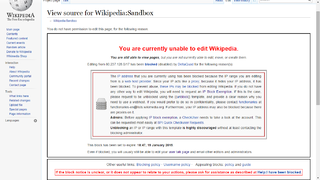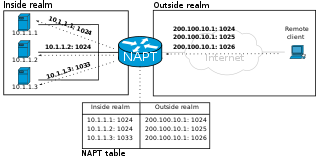An Internet filter is software that restricts or controls the content an Internet user is capable to access, especially when utilized to restrict material delivered over the Internet via the Web, Email, or other means. Content-control software determines what content will be available or be blocked.

In computer networking, a proxy server is a server application that acts as an intermediary between a client requesting a resource and the server providing that resource.

IP address blocking, or IP banning, is a configuration of a network service that blocks requests from hosts with certain IP addresses. IP address blocking is commonly used to protect against brute force attacks and to prevent access by a disruptive address. IP address blocking can be used to restrict access to or from a particular geographic area, for example, the syndication of content to a specific region through the use of Internet geolocation and blocking.

In computer networking, port forwarding or port mapping is an application of network address translation (NAT) that redirects a communication request from one address and port number combination to another while the packets are traversing a network gateway, such as a router or firewall. This technique is most commonly used to make services on a host residing on a protected or masqueraded (internal) network available to hosts on the opposite side of the gateway, by remapping the destination IP address and port number of the communication to an internal host.
Internet censorship in Australia is enforced by both the country's criminal law as well as voluntarily enacted by internet service providers. The Australian Communications and Media Authority (ACMA) has the power to enforce content restrictions on Internet content hosted within Australia, and maintain a blocklist of overseas websites which is then provided for use in filtering software. The restrictions focus primarily on child pornography, sexual violence, and other illegal activities, compiled as a result of a consumer complaints process.

Parental controls are features which may be included in digital television services, computers and video games, mobile devices and software that allow parents to restrict the access of content to their children. These controls were created to assist parents in their ability to restrict certain content viewable by their children. This may be content they deem inappropriate for their age, maturity level or feel is aimed more at an adult audience. Parental controls fall into roughly four categories: content filters, which limit access to age inappropriate content; usage controls, which constrain the usage of these devices such as placing time-limits on usage or forbidding certain types of usage; computer usage management tools, which enforces the use of certain software; and monitoring, which can track location and activity when using the devices.
A wordfilter is a script typically used on Internet forums or chat rooms that automatically scans users' posts or comments as they are submitted and automatically changes or censors particular words or phrases.

Psiphon is a free and open-source Internet censorship circumvention tool that uses a combination of secure communication and obfuscation technologies, such as a VPN, SSH, and a Web proxy. Psiphon is a centrally managed and geographically diverse network of thousands of proxy servers, using a performance-oriented, single- and multi-hop routing architecture.
K9 Web Protection is discontinued content-control software developed by Blue Coat Systems. In 2016, K9 Web Protection was acquired by Symantec as part of the company's purchase of Blue Coat Systems.
There are a number of security and safety features new to Windows Vista, most of which are not available in any prior Microsoft Windows operating system release.
The following outline is provided as an overview of and topical guide to the Internet.
A public computer is any of various computers available in public areas. Some places where public computers may be available are libraries, schools, or dedicated facilities run by government.

Internet censorship is the control or suppression of what can be accessed, published, or viewed on the Internet enacted by regulators, or on their own initiative. Internet censorship puts restrictions on what information can be put on the internet or not. Individuals and organizations may engage in self-censorship for moral, religious, or business reasons, to conform to societal norms, due to intimidation, or out of fear of legal or other consequences.
Secure Computing Corporation (SCC) was a public company that developed and sold computer security appliances and hosted services to protect users and data. McAfee acquired the company in 2008.

Iran is notable for its degree of government-sponsored internet censorship. As of 2012, the country blocks approximately 27% of internet sites and as of 2013, blocks half of the top 500 visited websites worldwide. The Iranian government and Islamic Revolutionary Guard Sepah also block several social media and communications platforms, including YouTube, Facebook, Twitter, Blogger, Telegram, Snapchat, and Medium. The government also blocks some streaming services, including Netflix and Hulu. Sites relating to health, science, sports, news, pornography and shopping are also routinely blocked.

On the Internet, a block or ban is a technical measure intended to restrict access to information or resources. Blocking and its inverse, unblocking, may be implemented by the owners of computers using software. Some countries, notably China and Singapore, block access to certain news information. In the United States, the Children's Internet Protection Act requires schools receiving federal funded discount rates for Internet access to install filter software that blocks obscene content, pornography, and, where applicable, content "harmful to minors".
United States v. American Library Association, 539 U.S. 194 (2003), was a decision in which the United States Supreme Court ruled that the United States Congress has the authority to require public schools and libraries receiving E-Rate discounts to install web filtering software as a condition of receiving federal funding. In a plurality opinion, the Supreme Court ruled that: 1.) public libraries' use of Internet filtering software does not violate their patrons' First Amendment free speech rights; 2.) The Children's Internet Protection Act is not unconstitutional.

UltraSurf is a freeware Internet censorship circumvention product created by UltraReach Internet Corporation. The software bypasses Internet censorship and firewalls using an HTTP proxy server, and employs encryption protocols for privacy.
Internet censorship circumvention is the use of various methods and tools to bypass internet censorship.
The precise number of websites blocked in the United Kingdom is unknown. Blocking techniques vary from one Internet service provider (ISP) to another with some sites or specific URLs blocked by some ISPs and not others. Websites and services are blocked using a combination of data feeds from private content-control technology companies, government agencies, NGOs, court orders in conjunction with the service administrators who may or may not have the power to unblock, additionally block, appeal or recategorise blocked content.








